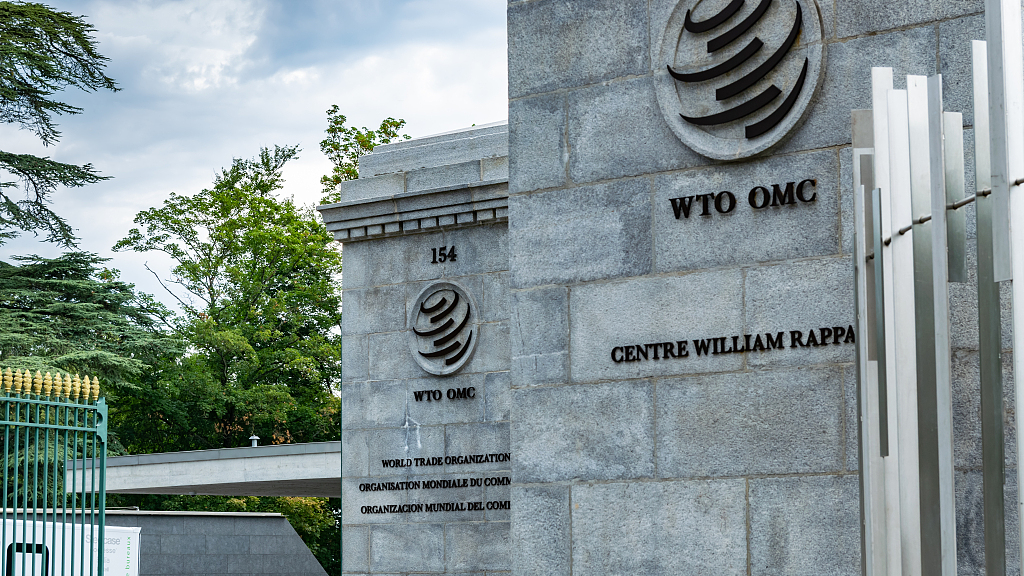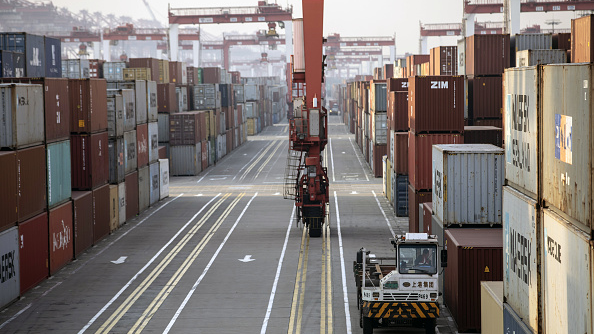
Editor's note: Daryl Guppy is an international financial technical analysis expert. He has provided a weekly Shanghai Index analysis for Chinese mainland's media for more than a decade. Guppy appears regularly on CNBC Asia and is known as "The Chart Man." He is a national board member of the Australia China Business Council. The article reflects the author's opinions and not necessarily those of CGTN.
What do you do when the independent umpire rules against you? It has become a key question for the United States as it ponders its response to the recent ruling from the World Trade Organization (WTO) arbitrator in Geneva. The ruling said China could slap duties on U.S. imports worth $645 million annually as part of a long-running anti-dumping dispute with Washington.
This is not an idle question. The United States, and its allies, have made preservation of the global rules-based order a central plank of their disputes with China. This demand to respect the rulings of world bodies has been central to the U.S., the UK, Japanese and Australian narrative on the South China Sea.
That narrative already has frayed edges, with the United States refusing to ratify the United Nations Convention on the Law of the Sea (UNCLOS) whilst demanding that other countries abide by UNCLOS rulings in the South China Sea. And that fraying goes to the core of the potential U.S. reaction to the most recent Geneva ruling. Does the United States treat seriously its obligation to abide by the rulings of this international global order when the rulings go against it?
Past history would suggest not, with the United States cheerfully ignoring many UN rulings including the illegal U.S. mining of harbors in Nicaragua. However, the refusal to obey rulings of international bodies pre-dates the change in policy approach which has seen the United States, and its allies, champion the rules-based global order and positions themselves as the ultimate protectors of this order.
If the United States again ignores or dismisses the most recent WTO Geneva ruling, it will diminish its credibility when it comes to its demands that others abide by these rulings. Rejecting or avoiding the Geneva ruling also damages the credibility of U.S. allies who want to paint a united front when it comes to supporting a global rules-based order.

Shipping containers next to gantry cranes at Yangshan Deepwater Port in Shanghai, China, January 11, 2021. /Getty
Shipping containers next to gantry cranes at Yangshan Deepwater Port in Shanghai, China, January 11, 2021. /Getty
Early responses from the United States suggest they will attack the umpire and the legitimacy of the institutions under which the ruling has been made. This attack on the WTO is a hangover of a crude policy from the Donald Trump years. President Trump did his best to dismantle or hobble the WTO. His most egregious action was his refusal to allow the replacement of arbitration judges which effectively froze the settlement of trade disputes.
This was too much even for the Australians, who eventually supported an alternative dispute settlement mechanism to overcome the procedural block created by Trump's activity. However, the Trump years saw a concerted campaign to destroy, or at the very least, restructure, the WTO because Trump believed it did not act in America's interests.
Other smaller nations which rely on free and open trade eventually found the courage to oppose Trump, albeit while supporting the need for WTO change rather than wholesale destruction. The Geneva ruling also puts them in an uncomfortable position because if they are to remain true to their support for the institutions of the global rules-based order then they have no choice but to support it.
It will not be an easy decision for some countries, although they may choose to follow the lead of the U.S. irrespective of any impact on their credibility. Australia, a frequent user of WTO challenges with more than 100 cases made against China, has a vested interest in ensuring that WTO decisions are respected and observed by all parties because of the protection if offers to the Australian economy. A U.S. refusal to accept this Geneva decision puts Australia in a tight spot.
Early responses from the U.S. suggest that rather than support the Geneva decision, it will be easier to blame the umpire and use this as an excuse to ignore the decision.
Adam Hodge, a spokesman for the U.S. trade representative, said the decision was "deeply disappointing" and "reflects erroneous Appellate Body interpretations. The decision reinforces the need to reform WTO rules and dispute settlement."
This is hardly a ringing endorsement of, or respect for, the independent decisions made by one of the central bodies responsible for the global rules-based order. Rather it shows a willingness to rip-up the foundations of the U.S. policy reliance on this order. It comes as no surprise as over the past decade the WTO has repeatedly ruled against the U.S. in this dispute and Washington has repeatedly failed to withdraw its illegal countervailing duties.
This decision is an important test of credibility for the United States. China should well use the ruling as a point of leverage in upcoming discussions around any Phase Two trade deal with the United States. However, it is an effective lever only if the United States stays true to its public policy stance and respects this WTO ruling. Unfortunately that respect cannot be counted upon.
(If you want to contribute and have specific expertise, please contact us at opinions@cgtn.com.)

